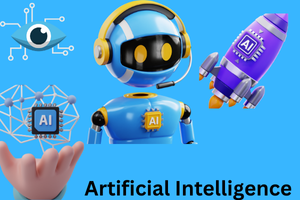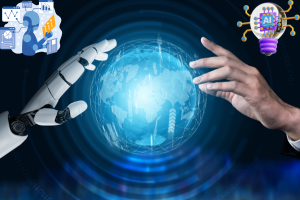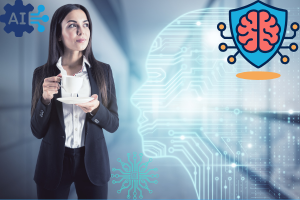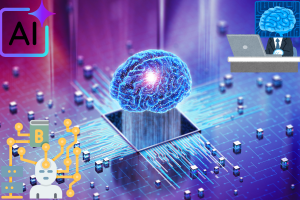Artificial Intelligence in Businesses: Changing the Work as We Know It.
Published: September 18, 2025

Artificial Intelligence in businesses is now used in the daily business processes, and it has transformed how we carry out business. AI allows a company to improve its operations and perform repeatable tasks, make decisions based on big data, and perform other tasks. This leads to customer engagement, productivity, and the adoption of new ideas. AI can become an added value to as many industries as possible, including retail, healthcare, logistics, and finance. Nevertheless, there is also the issue of AI integration, security, and its ethical application, which has emerged as a result of the effects of AI on business.
The possibilities of artificial intelligence in the business environment include AI-based supply chain management, AI-based digital marketing, and so on. In the competitive business environment, the desire and capacity to adopt AI technology have become a necessity for all organizations. The capability to incorporate AI into the systems of a given business is what makes it stand out among its competitors. This paper aims to explain how the application of AI is transforming the business world, presenting both its opportunities and challenges, and how companies must adopt AI to enhance productivity.
In case you are an executive attempting to apply AI to your organization or just a curious mind trying to learn how AI is changing various fields, the article will be of great help to you. We are going to discuss some actionable tactics and avoidable and problematic issues, as well as legitimate cases of business AI. By the time you finish reading this article, you will have learned enough information about AI to apply it in your organization.
- Artificial Intelligence: A Brief Overview
- •AI in Business Use Cases
- •What Are the Benefits of Artificial Intelligence in Business?
- •Identifying the Potential Dangers of AI in Businesses
- •Selecting the Right Tools for AI Integration
- •Developing a Strategy for AI Implementation
- •Actionable Tips and Insights for Adopting AI in Business
- •Real-World Examples of AI in Businesses
- •Conclusion: Staying Ahead of the Curve with AI
1-Artificial Intelligence: A Brief Overview.
Artificial Intelligence in businesses in other words, AI refers to the capability of a computer or a computer-controlled robot to do tasks that are more often than not related to intelligent beings. Such activities involve learning, determining, and understanding complicated scenarios and language. AI has already become a part of our everyday life through various applications and systems, including Siri, a voice assistant, an engine recommending what you should watch next on Netflix, and so on.
Artificial Intelligence in businesses in the digital era, artificial intelligence has become central to the accomplishment of automated tasks, filtering vast volumes of information to extract relevant fragments and optimizing decision-making processes. This expanding technology has continued to rely on various methods of deep learning and machine learning. This technology can analyze the given data and continually upgrade itself.
In recent years, technology has grown at a rapid pace, expanding the potential applications that artificial intelligence can support across various businesses. This has led to the development of chatbots, enhanced customer care, machine learning, personalized marketing, dynamic ads, and other aspects of artificial intelligence. The companies will now anticipate higher profits, increased margins from predictive analytics, and a greater level of accuracy in their forecasts.
2-AI in Business Use Cases
Artificial Intelligence in businesses all companies are automating business processes and devoting their attention to introducing a wide range of artificial intelligence across various industries. It has been focused more on time saving and disaster prevention. The following are some examples of artificial intelligence in business models and applications.
1-Reduction in Customer Interaction Human Service.
Artificial Intelligence in businesses voice recognition technologies are now able to enable customers to have an improved service standard. Virtual systems and AI chatbots offer twenty-four-hour services to the customers and twenty-four-hour service. Companies are now able to reduce the additional costs that they incur to provide decent customer service.
2-Data Collection and Data Analysis.
Artificial Intelligence in businesses an average business is provided with an average amount of data, which can be discouraging and annoying to handle. AI systems help create a system for organizing and analyzing data to extract pertinent figures and patterns. Through the use of AI systems, an organization is likely to achieve greater profits and higher margins.
3-Targeted Marketing
Artificial Intelligence in businesses can identify habits and behavior of customers to develop strong and artistic promotion campaigns. When businesses foresee the products and services a customer will require, they can provide a personalized experience that will significantly boost conversion rates.
4-Supply Chain Management
Artificial Intelligence in businesses in a business environment, every AI business and development software is working roughly similarly, predicting demand, maintaining and checking inventories, and predicting potential disruptions. Products will be introduced at the right time, and even unnecessary costs will not be incurred for unnecessary or excessive products.
4-Fraud Prevention
Artificial Intelligence in businesses is being used in the finance and e-commerce industries to identify and report fraud. Following certain operations and recognizing suspicious behavior enables AI to detect fraudulent transactions.
6-Staffing and Management
Artificial Intelligence in businesses processes become more efficient, such as automated resume screening, applicant screening, and the quickest in arranging interview schedules, the hiring process can be enhanced with a more sophisticated approach to these functions.
3-What are the advantages of artificial intelligence in business?

Artificial Intelligence in businesses the benefits that an organization can get out of artificial intelligence are many. It can be used to promote business growth, improve operations, and enhance customer satisfaction. The following are 7 advantages of artificial intelligence to the company:
- Increased Efficiency.
Artificial Intelligence in businesses embarking on AI solutions in business will result in increased focus on strategic business processes, as AI will handle day-to-day tasks such as responding to customer emails and questions, invoice management, and stock optimization/management.
- Cost Reduction.
- Artificial Intelligence in businesses the operational tasks and the business are blurred with the automation of the processes. Businesses can save on operational and administrative overheads.
- Better Decisions.
- Decide on making informed marketing and promotion choices based on the information that AI has given you. Test a new product coming into the company using AI-based systems.
- Enhanced Customer Support.
- Depending on the AI customer behavior, AI systems may provide personalized advice to the user, and businesses may create a customer-responsive system that enhances the relationship with their clients.
- Competitive Edge.
- Easing operations, improving customer satisfaction, reducing costs, effective promotions, prompt identification of risks and problems, and leveraging artificial intelligence to gain a competitive advantage are some of the reasons that keep a business ahead of its competitors.
- Innovation and Growth
- Artificial Intelligence in businesses new products and services can be developed with the help of AI. The business can experiment and invent novel solutions.
- Scalability
- Artificial intelligence systems are easily scalable with an expanding company. Throughout the development of a company, AI can manage more data, a larger customer base, and complex processes without requiring additional staff or physical resources.
4-Identifying the Potential Dangers of AI in Businesses

Artificial Intelligence in businesses issues that surround the use of artificial intelligence have been a thorn in the flesh of most people. Although the advantages cannot be overlooked, some of the more prevalent dangers that the use of AI encompasses are
- Biases in AI Algorithms
- Any computer can be programmed to accomplish sophisticated tasks and not fall into any biased results with the appropriate data. But with AI, one small error in information may make the entire process useless. Enterprises should find methods of making sure that their AI systems are audited regularly to prevent biased judgments.
- -Job Losses
- Artificial intelligence has the potential to automate new processes, which could lead to job losses due to automation. Businesses need to strike a balance between high levels of automation and providing their employees with opportunities to reskill and upskill.
- The risks of sensitive data are increased.
- Many cybersecurity attacks are likely to affect AI systems. It is possible that sensitive information could be destroyed and even stolen. Consequently, the data protocols should be triple-checked.
- Ethical Issues
- Artificial Intelligence in businesses Corporations should revisit the manner in which AI systems come up with their decisions since they are usually confidential and complex. This implies that the privacy and handling of customers’ data should be done ethically.
5-Selecting the Right Tools for AI Integration
Artificial Intelligence in businesses vintegris has identified some key issues that can help in selecting the most suitable AI tools and technologies to target the business.
1-Smooth Connection
Select AI tools that most effectively integrate and fit with various office systems and activities that your business has already put in place.
2-Growth
Select artificial intelligence technologies, which could expand and adapt as the business and engine diversify with other new features.
3-Flexibility
Select AI tools that are capable of being adaptable to meet business goals, e.g., to automate customer support to serve customers faster or to enhance the data analytical functions of the company.
4-Resource
It may be beneficial for AI companies to offer active customers additional assistance and training to use the tools more effectively.
6-Developing a Strategy for AI Implementation

Artificial Intelligence in businesses your new AI tools and technologies must be established in such a manner that they do not contradict the primary goal of the company. This may imply the identification of customer service and supply.
After establishing the correct tools, you should ensure that the team members are skilled in them. Monitoring business requirements implies that AI systems must be updated constantly.
7-Actionable Tips and Insights for Adopting AI in Business.
1-Start with the Basics
Artificial Intelligence in businesses test the AI systems on a pilot basis. It will provide you with a clue concerning its performance before you decide to invest more on a large scale.
2-Train Employees
The chances of resistance to change are high, but the tools will be used effectively with the training of AI.
3-Monitor and Optimize
Establish standards for your AI systems and make them optimized accordingly, as needed, based on the feedback of your staff and performance measurements.
8-Real-World Examples of AI in Businesses
Artificial Intelligence in businesses the use of AI is highly successful for many corporations. To illustrate, Amazon utilizes AI to streamline its product supply chain and analyze predictive buying patterns, recommending the most suitable products. Starbucks AI systems customize the customer experience and enhance inventory management.
These particular businesses demonstrate the spectrum and strength of AI in business and its widespread adoption.
9-Conclusion:
Artificial Intelligence in businesses the effects of AI are already being experienced in business, and it is evident that the technological revolution is enhancing the efficiency of operations and decision-making in companies that use AI tools. To businesses with diversified market operations, the benefits of AI applications are more likely to be positive than the operational expenses and risks, which makes it one of the most inevitable and essential elements of business strategies. To be successful, AI tactics require careful consideration to choose the appropriate technologies while concentrating on overall implementation and ongoing improvements. Consequently, the companies will not only be in a position to mitigate disruptions but also to exploit new sources of profitability and innovation.
FAQs
1-What is artificial intelligence in business?
Business artificial intelligence executes tasks automatically, examines data, and enhances decision-making to create a more efficient use of operations and customer service.
2-What can AI do to assist the business?
Artificial intelligence (AI) can help companies enhance productivity rates, improve customer relations, reduce operational expenses, and maximize revenues by analyzing customer data.
3-What will be the implications of AI in the business sector?
This might result in the division of the workforce demographics, in addition to unethical privacy and decision-making issues, the threat of bias due to structural problems, and the loss of overall data.
4-How can AI be applied in the business?
The detection of fraud and its interpretation, customer interactions, customer marketing AI, and predictive analytics are studied in various disciplines and can be applied in diverse ways.
5-Which is the most straightforward approach to using AI within the business structure?
The assimilation of various AI tools can be initiated by establishing a framework to automate business goals, integrate the different tools, and reorganize the goals and workforce.

- Be Respectful
- Stay Relevant
- Stay Positive
- True Feedback
- Encourage Discussion
- Avoid Spamming
- No Fake News
- Don't Copy-Paste
- No Personal Attacks



- Be Respectful
- Stay Relevant
- Stay Positive
- True Feedback
- Encourage Discussion
- Avoid Spamming
- No Fake News
- Don't Copy-Paste
- No Personal Attacks





